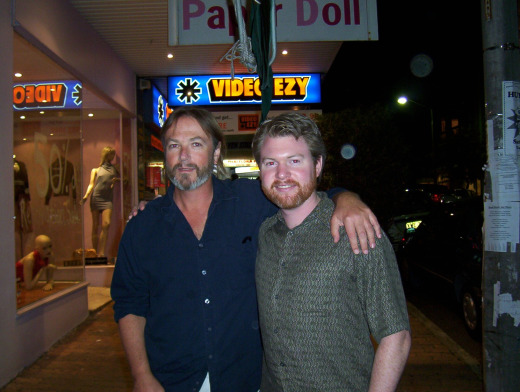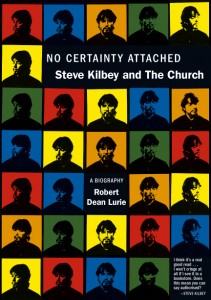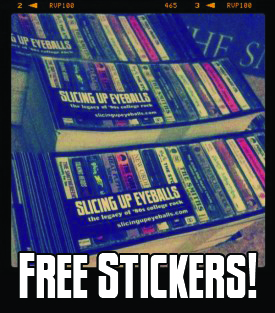
With Australian rockers The Church currently in the midst of a month-long 30th anniversary tour of the U.S., we thought we’d check in with an expert on the long-running band: Robert Lurie, author of last year’s biography “No Certainty Attached: Steve Kilbey and The Church.”
Lurie, a musician himself, discovered The Church in 1988, when the band’s Starfish and its crossover hit “Under the Milky Way” thrust it, ever so briefly, into the mainstream. From that point, he writes, The Church and its lead singer-songwriter Steve Kilbey took their “seat at the right hand of the Beatles” in his rock ‘n’ roll pantheon.
Coming from such a personal place, “No Certainty Attached” is both a rock biography and the story of what a band’s music can mean to its listeners, as Lurie puts himself into the story — not just as a distant fan; he even opened for a drug-hazed Kilbey at a London concert in the late ’90s. Lurie also was able to interview Kilbey extensively (“Write whatever you want about the drugs,” he told Lurie. “You have my blessing.”).
Lurie graciously agreed to answer our questions via e-mail about “No Certainty Attached,” the process in which he wrote the book and his overall thoughts on the band and its future as it celebrates 30 years of making great music.
Read Slicing Up Eyeballs’ Q&A with Robert Lurie after the jump…

SLICING UP EYEBALLS: First things first: Why Steve Kilbey? What inspired you — beyond, I’d imagine, simple fandom — to write a biography of The Church, a band known to most Americans, if at all, as an ’80s one-hit wonder?
ROBERT LURIE: Well, I suppose I could turn it back on you: Why “Slicing Up Eyeballs”? As you know, there is not a lot of money in documenting/championing these “modern rock” bands that we love so much. And yet it’s some kind of freakish compulsion, isn’t it? The name of your website has two meanings to me: On the one hand, it signals to anyone who owned Doolittle that you are a Pixies fan. But it also references a song that deals with obsession and madness. And we have to be a little mad to do what we do.
The intelligent biographer would dive right into “The Lady Gaga Story” (which would actually be pretty interesting) and take that all the way to the bank. As for me, the body of work that The Chuch has amassed — both collectively and individually — is too staggering to ignore. So it was something I had to write about. Before I could write about anything else. You start with what you know and love most dearly. Or anyway, I did.
EYEBALLS: How did you approach Kilbey about the book, and were you surprised with the level of access he gave you? Would you have still attempted the book without his cooperation?
LURIE: Like a stalker I pretty much showed up on his doorstep. Given that, it’s shocking that he participated to the level that he did. But we had a number of mutual friends and he must’ve gotten the word that I was (mostly) harmless. Perhaps my e-mails indicated that I could put sentences together in an acceptable way. I’d always said I would do the book with or without his participation. But in reality I’m almost certain I would have given up without him onboard.
EYEBALLS: Once he agreed, did you find it difficult to interview someone you’d looked up to for so long? You’d met him before, but surely it must have been an entirely different experience the first time you formally interviewed Kilbey.
LURIE: It was difficult, but he helped me a lot. It was only later on, when listening to some radio interviews of him from his earler years, that I realized how talkative and gracious he’d been in our sessions. There are a number of journalists — most of whom had the misfortune to talk to him in the ’80s — who consider him a very tough interview. But apart from the occasional flare-up, talking with him was a very smooth experience. He had a lot of stories to tell.
EYEBALLS: Did it help that you also are a musician and songwriter?
LURIE: Yes, and maybe this unlocks the mysteries I mentioned above. Musicians DO speak a special language. A further help was the fact that, in addition to being heavily influenced by The Church, I had also been influenced by many of same bands (as well as writers) that Steve grew up listening to/reading. If we had nothing else talk about, it was very easy to fall into geeky dissections of David Bowie and Neil Young — and, for that matter, “Doctor Who,” Tolkien, C.S. Lewis, et al. Then we just became two opinionated fans debating the merits (or lack therof) of, say, Bowie’s ’90s albums. Going into the project, I had not been aware of how much we had in common. But it makes sense. There was clearly something in his lyrics that seemed familiar to me from the very beginning.
EYEBALLS: This isn’t some straight-laced, academic biography; while you did extensive reporting and interviewing, you also put yourself — as both a musician and diehard fan of The Church — in the book, lending it a more personal, conversational tone. What led you to take that approach?
LURIE: A couple things. As a reader, I’m a fan of the so-called New Journalists — writers like Gay Talese and Norman Mailer, and the guys who brought it to music: Nick Tosches and Lester Bangs. They had a tendency to put themselves into their stories — sometimes rather gratuitously. But I like that a lot. I like the idea of the writer as guide, as a stand-in for the reader. On the one hand, it’s the height of hubris for Norman Mailer to assume we’d be interested in reading about his morning jogs with Muhammad Ali prior to the “Rumble in the Jungle.” But on the other hand, Mailer is aboslutely correct: I AM interested. Those scenes, if done correctly, humanize the story.
The other reason is that, for me, Steve’s story is very personal. This was not a matter of a writer picking an interesting subject, this was something I’d allowed into my DNA at a very early age. I was faced with the choice of either burying that or just getting it out in the open. Why not just be me? I made a gamble, hoping that if I wrote it with enough heart, people would care.
EYEBALLS: In terms of the actual writing, did you find it difficult to put so much of your own story into it, or did that come easy?
LURIE: No, those were the easy parts. I ended up with a lot of superflous material that then had to be hacked away. More difficult was to invest the biographical sections with the same energy that I brought to the “scenes.” It’s not that I wasn’t passionate about the material — if anything, I was more passionate about Steve’s life than about my own — but it was easy to get hamstrung with dates, session trivia, tour itineraries, footnotes: which are crucial in a music biography but can bog down the flow of the writing. Steve hates all that stuff anyway. He would not have been pleased if the book had read like a newspaper. Earlier drafts fell into that trap, and he steered me away from that quite brutally. God bless him.
EYEBALLS: As both a biographer and simply a fan, what makes The Church’s music and its story so compelling? And what do you think casual fans, or those not really familiar with the band at all, can take from your book?
LURIE: The Church hit a lot of sweet spots. The songs are very melodic — and by that, I don’t just mean in terms of the vocal melodies. The guitar playing really “sings” in a way that you don’t hear very often. I can think of just a few reference points: David Gilmour, George Harrison, Tom Verlaine. You just can’t go wrong with that. The lyrics are impressionistic enough to mean different, equally valid things to different people. It doesn’t always come together, but when it does, and if your mind is primed for it — it turns the key like nothing else. It’s a drug.
EYEBALLS: On a personal level, what’s your favorite era/style of The Church?
LURIE: I’m actually really excited about what they’re doing right now. Which is a little bit frustrating because it’s all happened since the book was completed. But I think their Untitled #23 album touches on everything I love about the band. And Steve’s album with Martin Kennedy is beautiful in a Frank Sinatra/Nelson Riddle way. Seriously.
EYEBALLS: The Church currently are on tour celebrating their 30th anniversary. What do you think’s next? What do you see ahead for both Steve Kilbey and The Church?
LURIE: I think they’ll keep going. They’ve carved out a small but devoted following, and as long as they can maintain that, they’ll keep playing. There’s a musical chemistry between those four that transcends any personal disagreements or differences, and I know they recognize that. The music is a drug to them, too. They take it very seriously.
EYEBALLS: Finally, has this experience whet your appetite to write more rock biographies? Or was this a one-of-a-kind experience for you because of your own intense relationship to The Church’s music?
LURIE: I will write more. Though I don’t want to just be a music journalist. I’ll just keep writing about what interests me: which includes rock music and everything else.
PREVIOUSLY ON SLICING UP EYEBALLS
- The Church plots ‘An Intimate Space’ 30th anniversary acoustic tour of U.S.
- The Church releasing new ‘Operetta’ EP, reissuing ‘Back With Two Beasts,’ ‘Shriek’
- New releases: New studio albums from The Church, Meat Puppets
- The Church issues new ‘Untitled #23′ album, plots summer tour of U.S.












